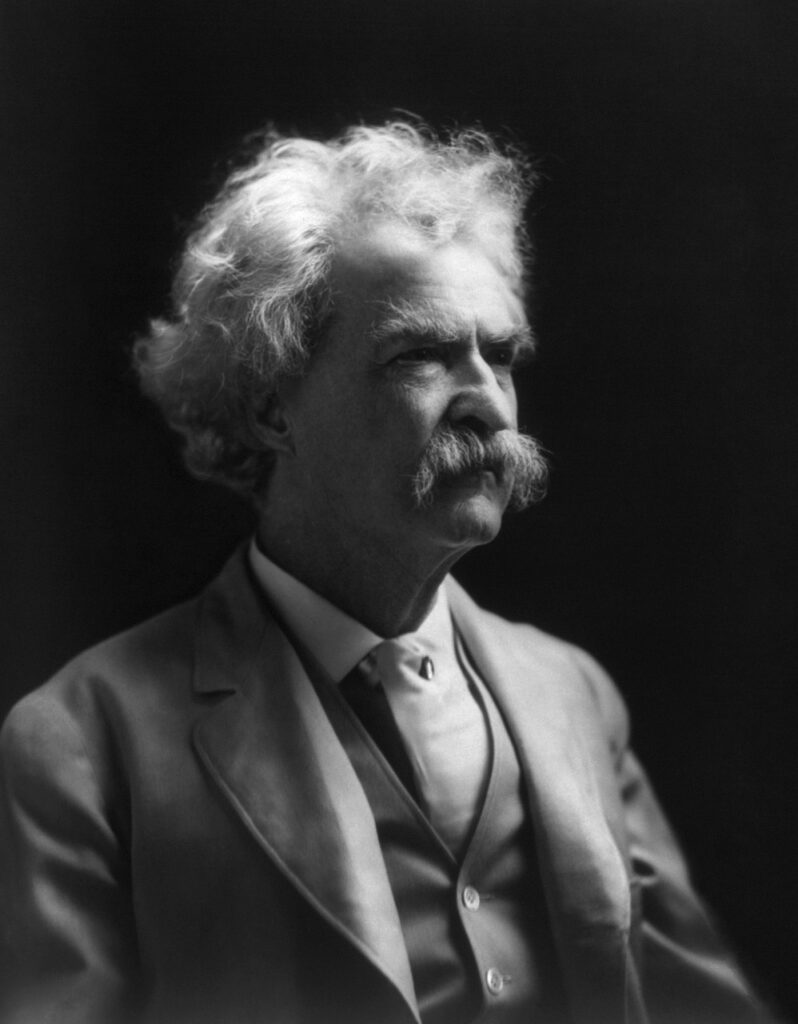Navigating Leadership’s River: Mark Twain’s Timeless Wisdom
 Charting Twain’s Leadership Voyage
Charting Twain’s Leadership Voyage
“The two most important days in your life are the day you are born and the day you find out why.”
Mark Twain’s words resonate across time, speaking to the very essence of human existence—the quest to discover our purpose and make our mark on the world. While Samuel Langhorne Clemens, better known by his pen name Mark Twain, may be celebrated as one of America’s greatest literary treasures, his life story and the wisdom distilled from it transcend the realms of literature and illuminate the path of leadership with unparalleled brilliance.
In a career that spanned over four decades, Mark Twain chronicled the American experience with unparalleled wit, wisdom, and humor. From his humble beginnings in Missouri, navigating the Mississippi River as a riverboat pilot, to his evolution as a prolific writer and a fervent advocate for social justice, Twain’s life journey offers an extraordinary tapestry of leadership lessons.
As we embark on this exploration of leadership through the lens of Mark Twain’s life and works, we invite you to delve into the depths of a man who not only crafted timeless stories but also lived a life replete with trials and triumphs. In these pages, we will uncover the invaluable insights gleaned from Twain’s early years of resilience, his transformation into a master communicator, the audacious adventures that shaped his character, and the profound impact he left on society through his advocacy and literature.
Mark Twain’s leadership lessons are not confined to the dusty pages of history but continue to inspire leaders of today and tomorrow. His journey reflects the essence of what it means to lead—with courage, humor, empathy, and a commitment to change the world for the better.
Join us on this voyage down the Mississippi of leadership as we navigate the waters of Twain’s life and stories, discovering the timeless wisdom that lies beneath the surface. In the following pages, we will unravel the fascinating chapters of a man who, much like the characters in his tales, embarked on a daring adventure called life, leaving behind a treasure trove of leadership lessons for us all to uncover and embrace.
Early Years and Lessons
Mark Twain’s journey as a literary luminary began in a small Missouri town on November 30, 1835. Born as Samuel Langhorne Clemens, he came into the world during a time when the nation itself was still finding its footing. Little did young Sam know that he would grow up to become not only a celebrated author but also a beacon of wisdom for leaders of all generations.
Twain’s Upbringing and Formative Experiences
Twain’s early life was far from glamorous. He was born the sixth of seven children to John Marshall Clemens and Jane Lampton Clemens. His father was a judge and land speculator, while his mother was a homemaker. However, the family’s fortune took a downturn when Sam was just 12 years old, as his father passed away, leaving them in financial hardship.
This early adversity would prove to be a crucible for young Sam. He had to leave school and work as a printer’s apprentice to help support his family. It was during these formative years that he developed a strong work ethic, resilience, and a deep sense of responsibility. These qualities, forged in the fires of adversity, would later become integral to his leadership journey.
Lesson 1: The Power of Resilience in the Face of Adversity
Twain’s life teaches us that adversity is not an impediment to leadership but rather a crucible that can forge exceptional leaders. His ability to persevere through financial hardship, family tragedy, and the challenges of an ever-changing world exemplifies the power of resilience. Leaders, too, often face unexpected setbacks and obstacles. Twain’s early life reminds us that it is not the adversity itself but how we respond to it that defines our leadership.
Lesson 2: The Importance of Embracing Curiosity and Lifelong Learning
Despite leaving formal education at a young age, Twain’s thirst for knowledge remained unquenchable. He continued his education through voracious reading and a keen observation of the world around him. His insatiable curiosity and dedication to lifelong learning laid the foundation for his future success.
Leaders who prioritize learning and curiosity cultivate the ability to adapt to changing circumstances and seize opportunities that others might miss. Twain’s example encourages us to embrace learning as a lifelong pursuit, a cornerstone of effective leadership.
In this journey of self-discovery and self-reliance, Twain sowed the seeds of leadership that would later blossom in remarkable ways. The early lessons of resilience and the hunger for knowledge he imbibed during his formative years would serve as the keel that steadied his ship through the turbulent waters of life, propelling him toward literary greatness and leaving us with invaluable leadership insights to glean.
Becoming a Writer and Communicator
Mark Twain’s transformation from a printer’s apprentice into one of the most celebrated American writers of all time is a testament to his indomitable spirit and unwavering commitment to self-improvement. This phase of his life not only marked his emergence as a literary giant but also offered profound insights into the art of leadership, particularly in the realms of effective communication and storytelling.
Twain’s Journey as a Writer and Communicator
After working as a printer’s apprentice, Twain began his career as a typesetter and contributor for various newspapers. It was during this time that he adopted his famous pen name, “Mark Twain,” a riverboat term signifying two fathoms deep, a safe depth for navigation—a fitting choice for a man who would navigate the depths of human experience through his words.
His experiences in journalism exposed him to the power of the written word and the impact it could have on society. Twain’s wit and humor began to shine through his writings, captivating readers and earning him a growing reputation as a humorist and storyteller. This period of his life laid the groundwork for his later literary achievements.
Lesson 3: Effective Communication and Storytelling as Leadership Tools
Twain’s ability to communicate effectively and tell compelling stories played a pivotal role in his leadership journey. As a writer and lecturer, he had a remarkable knack for connecting with diverse audiences and conveying complex ideas in a relatable and entertaining manner.
Leaders can learn from Twain’s mastery of communication. Whether addressing a small team or a large audience, the skill of conveying ideas with clarity and engaging storytelling is essential. Twain’s humorous anecdotes and relatable characters endeared him to readers and listeners alike, emphasizing the importance of using humor and storytelling as tools to build rapport, convey messages, and inspire others.
Lesson 4: The Role of Humor in Building Rapport and Influence
Humor was an integral part of Twain’s writing and speaking style. His humor was not only a source of entertainment but also a powerful means of disarming criticism and addressing sensitive issues. Twain’s wit allowed him to broach difficult topics and connect with people from all walks of life.
Leaders who incorporate humor into their leadership approach often find it easier to build rapport, diffuse tension, and foster a positive work environment. Twain’s use of humor reminds us that laughter can be a bridge to understanding and cooperation in leadership.
Twain’s journey as a writer and communicator underscores the significance of effective communication and the strategic use of humor in leadership. His ability to craft stories that resonated with the masses and convey profound ideas through entertaining narratives remains a timeless lesson for leaders in all fields. In the next section, we will embark on a voyage through the adventurous chapters of Twain’s life, where we discover how audacious risks and life-altering experiences further enriched his leadership narrative.
Adventures and Risk-Taking
Mark Twain’s life was punctuated by adventures that mirrored the unpredictable currents of the Mississippi River, and it was through these audacious journeys that he continued to gather leadership insights. From his time as a riverboat pilot to his globetrotting adventures and forays into entrepreneurship, Twain’s willingness to embrace risk and embrace life’s uncertainties had a profound impact on his leadership journey.
Twain’s Travels and Adventures
Before Mark Twain became an internationally renowned author, he embarked on adventures that would shape his character and worldview. As a young man, he fulfilled his dream of becoming a riverboat pilot on the Mississippi River, an experience that exposed him to the complexities of navigation, the diversity of people along the riverbanks, and the ever-changing nature of the river itself. This adventure not only provided him with material for his later works but also instilled in him a sense of adventure and a willingness to take calculated risks.
Twain’s travels extended far beyond the Mississippi River. He embarked on a grand tour of Europe and the Holy Land, chronicling his experiences in “The Innocents Abroad.” This journey broadened his horizons, exposed him to different cultures, and deepened his understanding of the world. It also reinforced his belief in the power of observation and the importance of seeing the world through different lenses.
Lesson 5: The Value of Taking Calculated Risks in Leadership
Twain’s adventures teach us that calculated risks can lead to significant rewards. While becoming a riverboat pilot might have seemed like a risky endeavor, it provided him with invaluable experiences and insights that would later inform his writing. Leaders, too, often face situations where taking calculated risks can lead to innovation and growth.
However, it’s essential to emphasize the word “calculated” in the context of risk-taking. Twain didn’t blindly rush into uncharted waters; he carefully assessed the situation, learned from experienced mentors, and made informed decisions. In leadership, calculated risk-taking involves thorough analysis and a willingness to learn from both successes and failures.
Lesson 6: Learning from Failures and Setbacks
Twain’s life was not without its share of setbacks and failures. He experienced financial hardships, business ventures that ended in bankruptcy, and personal tragedies. However, his ability to learn from these setbacks and continue forging ahead exemplifies resilience and the capacity to turn adversity into opportunity.
Leaders, too, must be prepared to face failures and setbacks on their journeys. Twain’s example reminds us that it’s not the failures themselves but our responses to them that define our leadership. By learning from failures and setbacks, leaders can adapt, grow, and ultimately become more effective in their roles.
Mark Twain’s adventures and willingness to embrace risk offer profound lessons for leaders. Whether navigating the Mississippi or exploring foreign lands, his experiences enriched his leadership narrative with invaluable insights. In the following section, we will delve into Twain’s role as a social commentator and advocate, where his leadership principles were put to the test in the tumultuous waters of societal change.
Social Commentary and Advocacy
Mark Twain was not content with being a mere observer of the world; he was compelled to be an active participant in the societal changes of his time. His role as a social commentator and advocate set him apart not only as a writer but as a leader who used his platform to champion important causes and challenge the status quo. In this section, we explore Twain’s engagement with social issues and the leadership lessons derived from his advocacy efforts.
Twain’s Involvement in Social Issues
Twain’s experiences were deeply intertwined with the tumultuous social and political landscape of 19th-century America. He witnessed the horrors of slavery, the brutality of the Civil War, and the injustices faced by marginalized communities. These experiences left an indelible mark on his conscience and fueled his commitment to social reform.
One of his most notable efforts was his friendship with abolitionist John Brown and his public condemnation of slavery. Twain’s support for the abolitionist cause was not without risks, as advocating for racial equality was a radical stance in his time. However, he remained steadfast in his convictions, using his writing and speaking platforms to denounce the inhumanity of slavery.
Lesson 7: Using One’s Platform for Positive Change and Social Impact
Twain’s commitment to social advocacy teaches us that leadership is not confined to the boardroom or the executive suite. Leaders have the opportunity—and often the responsibility—to use their platforms to address pressing societal issues. Twain’s example reminds us that leadership involves speaking up for what is right, even when it is unpopular or controversial.
Leaders can draw inspiration from Twain’s courage to advocate for positive change. Whether addressing issues of social justice, environmental conservation, or community well-being, leaders can leverage their influence to make a meaningful impact on the world.
Lesson 8: Staying True to One’s Principles While Navigating Complex Waters
Twain’s advocacy efforts were not without challenges and controversies. His outspoken views on issues like slavery and imperialism often drew criticism and backlash. However, he remained steadfast in his principles and maintained his commitment to social justice, even in the face of adversity.
Leaders can learn from Twain’s unwavering dedication to his principles. Navigating complex ethical and moral dilemmas is an integral part of leadership. Twain’s example encourages leaders to stay true to their core values and convictions, even when it requires courage and resilience in the face of opposition.
Mark Twain’s role as a social commentator and advocate underscores the transformative power of leadership when aligned with principles of justice and equity. His commitment to addressing societal issues serves as a timeless reminder that leaders have the potential to be catalysts for positive change. In the next section, we delve into Twain’s literary works to uncover leadership themes that continue to resonate in the modern world.
Leadership in Literature
Mark Twain’s literary contributions extend far beyond entertainment; they are a rich source of leadership wisdom that continues to inspire readers and leaders alike. In this section, we delve into Twain’s literary works, exploring the profound leadership themes and lessons woven into the fabric of his stories.
Exploration of Leadership Themes in Twain’s Literary Works
Twain’s storytelling genius shines through in his novels and short stories, and his characters often grapple with issues of identity, morality, and societal norms. One of his most iconic works, “The Adventures of Huckleberry Finn,” features the journey of Huck and Jim down the Mississippi River, a journey fraught with moral dilemmas and lessons on human nature.
Through the eyes of Huck and Jim, Twain explores themes of individuality, the quest for freedom, and the complexity of human relationships. These themes serve as a canvas upon which leadership lessons are painted.
Lesson 9: The Role of Empathy and Understanding in Leadership
One of the central themes in Twain’s work is the development of empathy and understanding. Huck Finn’s journey from prejudice to empathy as he comes to see Jim, an escaped slave, as a fellow human being is a powerful lesson in the importance of empathy and inclusivity in leadership.
Leaders who cultivate empathy and understanding are better equipped to lead diverse teams and navigate complex interpersonal dynamics. Twain’s storytelling encourages us to see beyond surface differences and recognize the humanity in others, fostering stronger connections and more effective leadership.
Lesson 10: Encouraging Individuality and Critical Thinking in Your Team
Twain’s characters often challenge societal norms and question authority. Whether it’s Huck’s rejection of the conformity expected of him or Tom Sawyer’s penchant for imaginative adventures, Twain champions the value of individuality and critical thinking.
Leaders can draw from this lesson by fostering an environment that encourages team members to think independently, express their unique perspectives, and challenge the status quo when necessary. Twain’s characters remind us that innovation and growth often arise from the creative and critical thinking of individuals.
In Twain’s literary world, leadership is not just about authority and hierarchy; it’s about the values, beliefs, and actions that define individuals and shape their interactions with others. His stories serve as a tapestry of leadership insights, woven together with memorable characters and timeless lessons.
As we reflect on Twain’s literary legacy, we find ourselves not only entertained but also enriched with a deeper understanding of leadership dynamics. In the next section, we examine Twain’s enduring influence on contemporary leaders who have drawn inspiration from his life and works, demonstrating that his leadership lessons continue to ripple through time.
Twain’s Legacy and Relevance Today
Mark Twain’s impact on literature and his insights into leadership were not confined to his era but have rippled through time, leaving an indelible mark on subsequent generations of leaders and thinkers. In this section, we explore Twain’s enduring legacy and his relevance in the modern landscape of leadership.
Reflecting on Mark Twain’s Enduring Influence
More than a century after his passing, Mark Twain’s writings continue to be studied, celebrated, and adapted into various forms of media. His characters and stories have become archetypes in American literature, serving as a wellspring of inspiration for writers, scholars, and leaders alike.
Twain’s enduring relevance can be attributed to his ability to tap into universal themes and human experiences. His writings transcend time and culture, addressing fundamental questions about identity, morality, and the human condition that remain as pertinent today as they were in the 19th century.
How Twain’s Lessons Apply in Modern Leadership Contexts
Twain’s leadership lessons, drawn from his life and works, find resonance in contemporary leadership challenges. In a world marked by rapid change, diversity, and complexity, leaders can draw from Twain’s wisdom to navigate the complex waters of modern leadership.
Leaders today continue to face the need for resilience in the face of adversity (Lesson 1) and the importance of embracing curiosity and lifelong learning (Lesson 2). Effective communication and storytelling (Lesson 3) remain critical leadership tools in the digital age, as leaders must engage and inspire their teams and stakeholders.
Moreover, the value of humor (Lesson 4) in building rapport and influence has not diminished, and the lessons of taking calculated risks (Lesson 5) and learning from failures (Lesson 6) are as relevant as ever in a dynamic business landscape.
In the realm of social advocacy, Twain’s example of using one’s platform for positive change (Lesson 7) resonates with leaders who seek to address pressing issues like climate change, social justice, and inequality. Additionally, staying true to one’s principles (Lesson 8) while navigating complex waters is a timeless leadership quality that continues to inspire.
The exploration of empathy and understanding (Lesson 9) is vital in today’s diverse and globalized workplaces, and leaders who encourage individuality and critical thinking (Lesson 10) are better positioned to foster innovation and adaptability within their teams.
Contemporary Leaders Inspired by Twain
Twain’s influence extends to contemporary leaders who have drawn inspiration from his life and works. CEOs, politicians, and thought leaders have cited Twain’s leadership principles as guiding lights in their own journeys. Their stories and testimonials serve as testament to the enduring relevance of Twain’s wisdom.
In conclusion, Mark Twain’s legacy as a writer, humorist, adventurer, and advocate reverberates through time, offering a treasure trove of leadership lessons that continue to illuminate the path for leaders today. As we reflect on the life and works of this literary giant, we are reminded that the wisdom distilled from his experiences and stories transcends the boundaries of time and space, guiding us as we navigate the ever-changing waters of leadership in the 21st century.
Anchoring Twain’s Leadership Legacy
Mark Twain, the man who penned stories of adventures along the Mississippi, humorous escapades, and poignant social commentary, has left an indelible mark not only on literature but also on the art of leadership. In this journey down the river of Twain’s life and works, we have uncovered a wealth of leadership lessons that continue to resonate in the modern world.
As we conclude this exploration, it is evident that Mark Twain’s life was a tapestry of resilience, curiosity, and unyielding principles. From his humble beginnings in Missouri to his transformation into a master communicator, Twain’s journey teaches us that leadership is not a static destination but an evolving process of self-discovery and growth.
Twain’s fearless embrace of adventure and calculated risks reminds us that leadership often requires stepping out of one’s comfort zone and navigating the unknown. His ability to learn from failures and setbacks underscores the importance of resilience and adaptability in leadership.
In his role as a social commentator and advocate, Twain’s example challenges us to use our platforms for positive change and stay true to our principles, even when faced with opposition. His stories remind us of the power of empathy and understanding in building bridges across divides and fostering inclusive environments.
Through his literary works, Twain offers a mirror reflecting the complexities of human nature and society, guiding us to embrace individuality and critical thinking as essential leadership traits.
Mark Twain’s enduring legacy stands as a testament to the timeless wisdom he imparted. His writings, leadership principles, and the contemporary leaders who draw inspiration from him serve as a bridge between the past and the future, reminding us that leadership is not confined to any specific era or context—it is a journey that transcends time.
As we navigate the complex waters of the 21st century, we would do well to heed the lessons of Mark Twain. His life and works remind us that leadership is not just about leading others but also about leading oneself with courage, integrity, and a commitment to making the world a better place. Like Twain’s beloved characters, we, too, can embark on adventures of leadership, armed with the wisdom of the past and the promise of the future, as we sail into the unknown, in search of our own two most important days.





